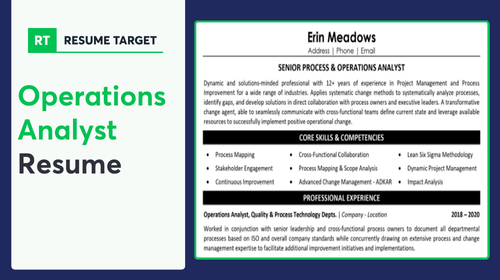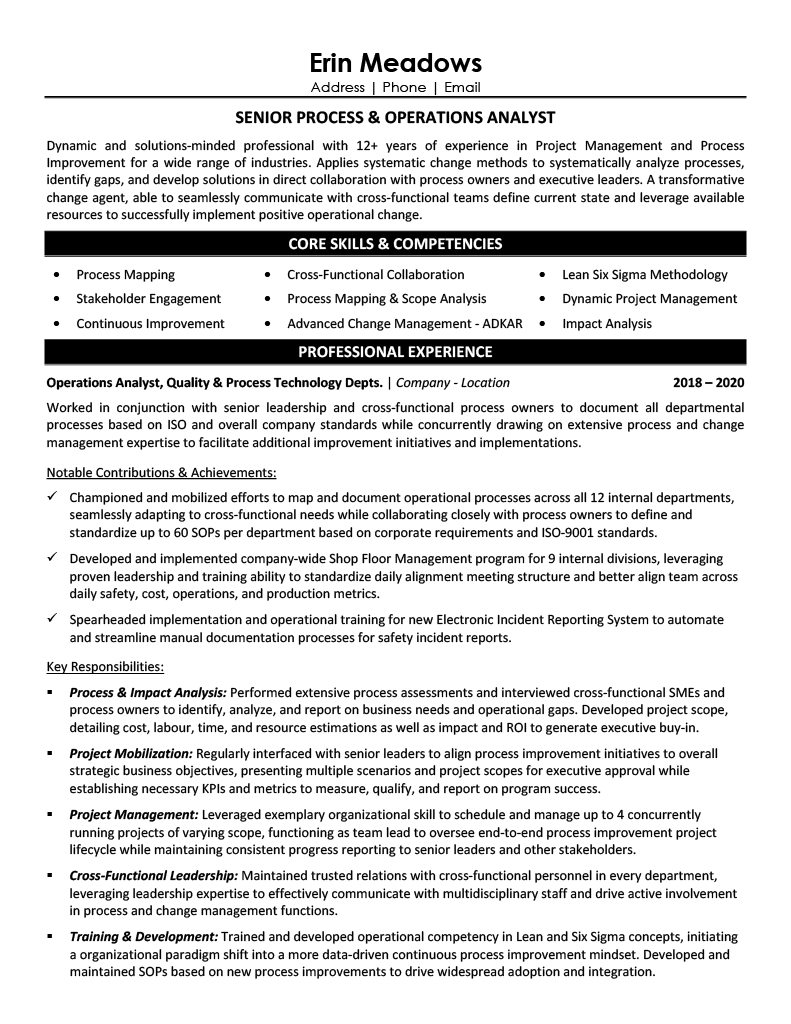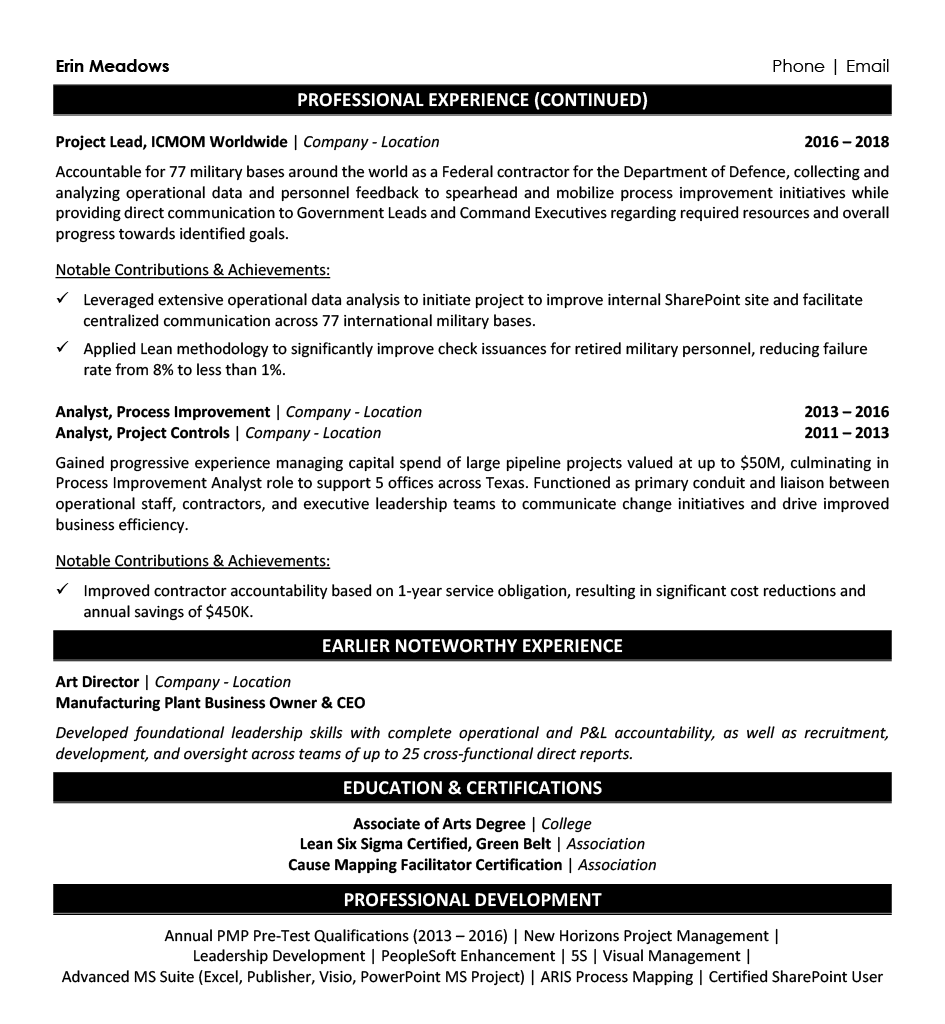

Translating complex business operations into compelling resume content can feel like solving a Rubik's cube blindfolded. Many analysts get stuck trying to quantify their diverse contributions across multiple business areas.
Are you wondering how to showcase your analytical prowess without drowning in technical jargon? Your resume needs to bridge the gap between detailed operations work and clear business impact that hiring managers can instantly grasp.
Resume Target specializes in helping Business Operations Analysts transform their daily achievements into powerful success stories. We'll show you how to craft a resume that demonstrates your strategic thinking and problem-solving abilities while highlighting the measurable results that get interviews.


At the heart of every efficient business operation, you'll find Operations Analysts working behind the scenes to transform raw data into actionable insights, with studies showing they can help achieve up to 30% improvement in operational efficiency through their analytical work.
As an Operations Analyst, you'll wear multiple hats - from diving deep into data analysis and creating comprehensive reports to identifying bottlenecks in business processes and recommending strategic solutions that drive real-world improvements.
Whether you're just starting out or looking to advance your career, the Operations Analyst role offers a dynamic path forward, with opportunities to grow into senior analytical positions, operations management, or even executive-level strategy roles.
Let's talk about what makes Operations Analyst roles so exciting right now - your earning potential grows significantly as you gain experience and specialize in high-demand areas like business operations, logistics, or healthcare analytics. With a bachelor's degree as your foundation, you're positioned to build a rewarding career path with impressive compensation potential.
Figures from: U.S. Bureau of Labor Statistics
Ready to climb the operations analytics ladder? Your path from entry-level analyst to operations executive involves mastering data tools, leading teams, and developing strategic business insights.
Beyond basic analytical abilities, advancing in operations analysis requires a powerful combination of technical expertise and leadership capabilities.
- Data Analysis & Visualization (Tableau, Power BI) - Programming Languages (SQL, Python) - Process Improvement & Workflow Optimization - Strategic Communication & Team LeadershipBreaking into operations analysis typically starts with a bachelor's degree in business, mathematics, or computer science, combined with hands-on experience in data analysis and process improvement.
To build your foundation for an Operations Analyst career, you'll need to develop strong computer skills including business intelligence tools, statistical software, and databases, which you can gain through entry-level positions in data analysis or business operations.
Requirements from Teal HQ
From California's tech scene to Virginia's federal hub, Operations Analyst roles span government, manufacturing, and finance.
Figures from U.S. Bureau of Labor Statistics
Struggling to showcase your analytical prowess, process improvements, and operational achievements in a way that catches a hiring manager's eye? This comprehensive, section-by-section guide will walk you through creating a powerful operations analyst resume that highlights your impact on business efficiency and bottom-line results.
If you're like most Operations Analysts, translating your daily problem-solving and process improvement achievements into a compelling resume summary can feel more challenging than optimizing an entire workflow system.
While you excel at analyzing data and streamlining business operations, capturing your unique blend of analytical expertise and business acumen in just a few sentences requires a strategic approach that will immediately show hiring managers your potential impact.
How would you describe your unique blend of analytical skills and operational expertise in a way that sets you apart from other Operations Analysts?
Reason: Operations Analyst roles require a distinct combination of analytical thinking and practical operational knowledge. Articulating this blend helps create a compelling value proposition that immediately captures the reader's attention.
What are the primary industries or operational environments where you've applied your analysis skills, and how does this breadth of experience shape your approach to operational challenges?
Reason: Highlighting your industry exposure and operational context demonstrates adaptability and depth of experience, which are crucial differentiators in operations analysis roles.
How do you bridge the gap between data-driven insights and practical operational improvements in your role as an Operations Analyst?
Reason: This question helps articulate your ability to translate complex analysis into actionable business solutions, which is a core value proposition for Operations Analysts and a key element that hiring managers look for.
As an Operations Analyst, you'll need to showcase both your analytical expertise and your practical business process knowledge, making it crucial to strike the right balance in your skills section.
Your resume should highlight technical capabilities like data analysis tools and ERP systems, while also emphasizing essential business skills such as process improvement, workflow optimization, and cross-functional collaboration.
Many Operations Analysts struggle to translate their daily process improvements and efficiency gains into compelling resume achievements that capture executive attention. Transform your operational metrics into powerful success stories by connecting your process optimization efforts to concrete business outcomes like cost savings, productivity gains, and enhanced operational efficiency.
The responsibilities section demonstrates how Operations Analysts optimize business processes and drive organizational efficiency. Your role description should clearly show how you analyze data, implement solutions, and contribute to operational improvements in terms that both technical and non-technical hiring managers can appreciate.
Your education and certifications demonstrate your analytical capabilities and commitment to operational excellence. For an Operations Analyst role, prioritize credentials that showcase your data analysis skills, process improvement expertise, and relevant software certifications.
Now that you've built a strong foundation using Resume Target's proven resume writing guidelines, you're ready to transform your resume into a powerful tool for landing Business Operations Analyst positions.
While many job seekers only customize their cover letters, tailoring your resume for each Business Operations Analyst role is crucial for showcasing your precise match with the organization's operational needs and business objectives.
A customized resume not only helps you navigate through ATS systems by incorporating role-specific keywords, but it also demonstrates to hiring managers that your analytical skills and operational expertise align perfectly with their unique requirements.
Ready to stand out from other candidates? Let's turn your resume into a laser-focused presentation that proves you're the Business Operations Analyst they've been searching for!
Don't let a lack of experience hold you back from launching your career as a Business Operations Analyst!
Your academic background in business, analytics, or related fields, combined with your technical skills and any relevant project work or internships, can create a compelling story for employers.
Focus on highlighting your analytical abilities, technical proficiency with business tools, and problem-solving capabilities in your resume.
For a detailed roadmap to crafting your resume, check out the Student Resume Writing Guide to ensure you're positioning yourself effectively for this exciting career path.
Your resume summary is your chance to showcase how your academic excellence, internship experiences, and analytical skills make you an ideal candidate for operations analysis roles.
Focus on highlighting your relevant coursework, data analysis projects, and any process improvement initiatives you've been part of during your studies or internships.
"Detail-oriented and results-driven Business Operations Analyst with foundational experience through academic projects and internships in process optimization and data analysis. Demonstrated success in utilizing Excel, SQL, and visualization tools to analyze operational inefficiencies and propose solutions, resulting in 15% improvement in workflow efficiency during university capstone project. Proven track record of collaborating with cross-functional teams and delivering data-driven recommendations. Seeking to leverage strong analytical and problem-solving abilities to drive operational excellence and business process improvements."
Now's your chance to showcase how your academic background has prepared you for success as a Business Operations Analyst - turn those courses and projects into compelling proof of your analytical capabilities!
Don't just list your degree - highlight relevant coursework like "Business Process Modeling"or "Data Analytics,"and feature impactful projects where you analyzed operational efficiency or recommended process improvements.
Common courses for a Business Operations Analyst degree/certification include Business Administration, Operations Management, Finance or Accounting, Information Systems, Statistics or Data Science [1], Data analysis and visualization, Supply chain management, Forecasting and demand planning, Optimization and simulation, Inventory management, Business process management, Quality management and Six Sigma, Project management, Predictive analytics and machine learning, and Business analytics tools and software [2].Relevant Coursework: Business Administration | Operations Management | Data Analysis & Visualization | Business Process Management | Supply Chain Management | Project Management
Key Projects:
Supply Chain Optimization Analysis: Conducted comprehensive analysis of a retail company's supply chain operations to identify inefficiencies and develop data-driven solutions for improved performance.
Business Process Reengineering Study: Collaborated with cross-functional team to evaluate and redesign core business processes for a manufacturing client simulation.
Leverage your academic background, internship experiences, and technical certifications to showcase the perfect blend of analytical, technical, and business skills that today's operations teams are actively seeking.
As an aspiring Business Operations Analyst, your combination of technical and analytical skills positions you perfectly for roles where you can help organizations optimize their processes and drive meaningful business improvements, with excellent growth potential in this expanding field.
Let's face it - translating your daily impact on operational efficiency and process improvements into compelling resume content can feel like trying to measure air. You know you've made a difference, but putting those achievements into words that truly resonate with hiring managers is a whole different challenge.
At Resume Target, we specialize in crafting resumes that showcase the unique value Operations professionals bring to the table, having helped countless Business Operations Analysts transform their complex process improvements and KPI achievements into clear, compelling success stories.
Our deep understanding of operational metrics and business transformation initiatives means we know exactly how to position your experience for maximum impact.
With companies increasingly focused on operational excellence and efficiency, now is the perfect time to ensure your resume truly reflects your strategic impact - let's connect today to craft a resume that opens doors to your next opportunity.
Impress any hiring manager with our Operations resume writing service. We work with all career levels and types of Operations professionals.
Learn More → Operations Resume Writing Services